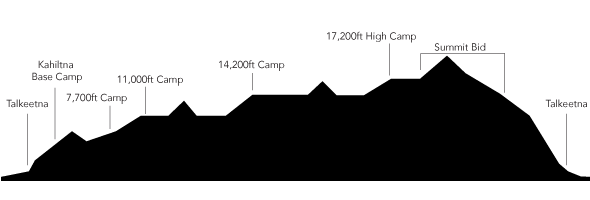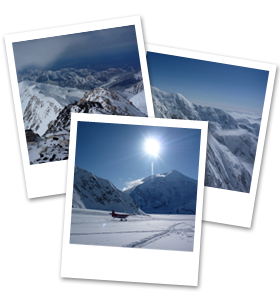Denali 
North America: 6,194m / 20,320ft
63° 4' 10.2" N,
208° 59' 33.36" E
First ascent: H Karstens, W Harper, R Tatum, and H Stuck, 1913

Climate at Denali
Typical weather stats during the challenge
- −59.7 °C
Lowest recorded temprature - −83.4 °C
Lowest recorded temp. with windchill
Denali is the local Athabaskan, and widely used name, for Mount McKinley, North America’s highest mountain. Denali is part of the Alaskan range of mountains located some 150 miles north of Anchorage, Alaska.

About Denali
Its reputation as a highly coveted summit derives from its location near the Arctic Circle and the Pacific Ocean giving it some of the most ferocious weather in the world. As a result of its location, in between Arctic and Aleutian weather systems, the weather on Denali is extremely unpredictable and unlike any other major mountain in the world. Extreme cold is another hallmark of Denali with temperatures routinely falling to -40 degrees Celsius. Denali’s unpredictable and savage weather is an underlying cause of many accidents.
It’s remoteness requires climbers to be responsible for their supplies of food, fuel and equipment for up to a month on the mountain, carrying loads of up to 65 kg, split between an expedition rucksack and a sled.The heavy loads and ferocious weather make Denali one of the toughest mountains in the world.


- The Athabaskan translation of Denali means “The Great One”.
- The vertical gain from base camp to the summit on Denali is 4,000m/13,123ft – a greater vertical gain than on Everest.
- On November 30, 2003, a temperature of −59.1 degrees Celsius, combined with a wind speed of 18.4 miles per hour, produced a North American record windchill of −83.4 degrees Celsius. Even in July, windchill temperatures as low as −50.7 degrees Celsius have been recorded on Denali.
- On average only 45% of climbers attempting the mountain successfully reach the summit. Last May due to bad weather conditions that percentage dropped to only 19%, however Richard was one of those lucky few to successfully summit that month.
- Mt. McKinley undergoes long periods of clear skies and high winds, and these conditions are most often seen during early part of the climbing season (April and May). During early part of the climbing season around May high winds and clear skies scour the mountain’s slopes clean of snow leaving behind solid blue ice testing the cramponing skills of even the most experienced climbers. During such weather, many climbers are lulled by the clear skies into going for the summit. However, these winds routinely exceed 100 mph and have been known to pick climbers up and throw them down the slopes.







